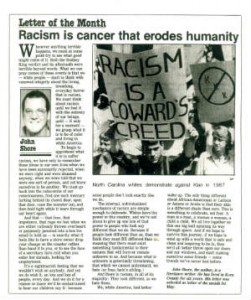 This morning I received an email from a Christian asking why I write what I do about the issue of LGBTQ people and Christianity. I popped off my pretty standard response: “Because it’s the right thing to do. It’s the Christian thing to do.” Then I went out to my garage to clean it a little.
This morning I received an email from a Christian asking why I write what I do about the issue of LGBTQ people and Christianity. I popped off my pretty standard response: “Because it’s the right thing to do. It’s the Christian thing to do.” Then I went out to my garage to clean it a little.
While there I came across an old box in which I found buried a photocopy of a Letter to the Editor that I’d written in May 1992 to The Bakersfield Californian, the big daily newspaper of the city in which my wife and I were then living.
The city right next to Bakersfield was Oildale. At that time, Oildale was the location of the Western Regional Chapter of the KKK. Everyone in the area knew that.
A month before I wrote my letter, riots had broken out in Los Angeles following the acquittal of the police officers accused in the videotaped beating of black motorist Rodney King. Young people might not remember the 1992 Los Angeles Riots, but they were extremely serious business. To quote from the Wikipedia entry on Rodney King:
By the time the police, the U.S. Army, the Marines and the National Guard restored order, the [riot’s] casualties included 53 deaths, 2,383 injuries, more than 7,000 fires, damages to 3,100 businesses, and nearly $1 billion in financial losses. Smaller riots occurred in other cities such as San Francisco, Las Vegas in neighboring Nevada and as far east as Atlanta, Georgia.
It made for live, 24-hour television viewing that was sickening to watch.
Anyway, the letter I wrote to the Californian went like this:
Whenever anything terrible happens, we must at some point try to see what good might come out of it. Both the Rodney King verdict and its aftermath were terrible beyond words. What we can pray comes of these events is that we—white people—start to think with renewed integrity about the living, breathing, everyday horror that is racism. We must think about racism until we feel it with the entirety of our beings, until—if only for a moment—we grasp what it is to be of color and living in white America.
To begin to apprehend what it is to suffer racism, we have only to remember those times in our own lives when we have been summarily rejected, when we were right and were shunned anyway, when we were told that we were one sort of person, and yet knew ourselves to be another. We must go back into the catacombs of our own consciousness, find one such memory lurking behind its closed door, open that door, coax the monster out, and then hold tight while it tears through our heart again.
And that—that fear, that impotence, that rage we feel when we are either callously thrown overboard or purposely jammed into a box too small to hold us—is exactly what it feels like to have a store owner drop your change on the counter rather than hand it to you, or to see the face of the person behind the front desk turn cold you when you enter their domain, looking for employment.
It’s a nightmarish feeling that we wouldn’t wish on anybody. And yet we do wish it, on lots and lots of people, every day. And we do it for a reason so inane we’d be embarrassed to hear our own children say it: because some people don’t look exactly like we do.
The internal, individualized mechanics of racism are simple enough to delineate. Whites have the power in this country, and we’re not about to give up one iota of that power to people who look any different than we do. Because if people look different than us, then we think they must be different than us, meaning that there must exist something fundamental to their natures that will forever remain unknown to us. And because what is unknown is potentially threatening, that which we cannot understand, we hate (or fear, hate’s sibling).
And there is racism, in all of its stupidity: They look different, so we hate them.
We, white America, had better wake up. The only thing different about African-Americans or Latinos or Asians or Arabs is that their skin is a different shade than ours. This is something to celebrate, not fear. A man is a man, a woman a woman, a child a child. We all live together on this one big ball spinning its way through space. And if we hope to survive this journey, if we hope to wind up with a world that is safe and clean and inspiring to be in, then we’d all better throw open our doors and our windows, and start making ourselves some new friends—some friends we’ve never had before.
Twenty years later, and the thing’s almost quaint, isn’t it?
Around that same time in Bakersfield I also started a group called Whites Against Racism—or WAR, for short. I plastered some twelve hundred WAR flyers all over town.
It took the KKK about half a day to find out where I lived.
They called. They came by my house. They threatened my wife.
Even the police held me for an afternoon (until they figured out I was fomenting anti-racist sentiments.)
At the time, I was a 31-year-old student at California State University at Bakersfield. In the college’s weekly newspaper, I wrote a very popular column called Small Change.
After the Rodney King verdict—and after everyone in town knew about my group WAR—a part of what I wrote in Small Change was this:
… Naturally, I feel compelled to offer my brilliant insights into the nature of our, shall we call it, racial discomfort. … Of course, talking about stuff like [race and race relations] is almost necessarily offensive, demanding, as the whole topic does, that you speak in broad and grossly inappropriate generalities.
But what the heck. Who better to be grossly inappropriate than me? So let’s do it. ….
I think that by and large the strife between blacks and whites—which on this campus is manifested in that awful, really cold kind of polarization—is the fault of (drum roll, please . . . maximum anticipation . . . unbearable tension . . . ) white people.
Oh, sit down! I’m not done!
It’s white people’s fault because this is America, and in America white people call all the shots. It’s the nature of the game, and anyone who says any different is either extremely dense, or, more usually, extremely white. . . .
And what does the black youth of this country hear when they turn on the television, when they listen to white America talking to them?
The hear: “The Pride is Back.”
They hear they are living in “a kinder, gentler America.”
And they’re not even almost buying it. To these young people the pride is black, and this “kinder, gentler America” crap is just more of whites patting whites on the back. These kids are claiming their own identity. If white America won’t grant them the dignity and respect a people must have in order to simply go about their business in as fulfilling a manner as possible, then they are going to react in the way people invariably will: they’ll retract, they’ll gather together, and they’ll get their own thing going.
And guess who won’t be invited to their party?
And so on.
Ah, good times.
Sort of.
Anyway, my point is this: if you have a moral conscience (which I hope we can all agree Christians can hardly brag proprietary ownership of), then the simple fact of your life is that you are obliged to defend life’s underdogs. You don’t (or at least not if you know what’s good for you) have a choice in that. I’m not proud of whatever teenie bit of work I’ve ever done in that regard, any more than I’m ever proud of taking out the garbage or doing my laundry. Like any normal person, I’m just . . . stuck doing those sorts of things.
I don’t like bitching at gay-bashing pastors. I don’t do it because I think it makes me seem cool, or whatever. I do it because … what else can I do?
What should I do with the letters I get? Not respond to them?
No thanks. I rather hedge my bets, in case I’m wrong and hell does exist. (Kidding. That was a joke. Hell doesn’t exist. And if it does, you better get busy making sure you don’t wind up there, crying as you realize that, after all, ten percent of what you made wouldn’t have been that much to give to charity.)
Victims of domestic violence. Gay teens being told the world would be a better place if they weren’t in it. Maligned and oppressed racial minorities. The physically and mentally challenged. Old people hidden away and suffering in bullshit state-run “facilities.”
If you’re capable, sane, alert, and have any resources whatsoever, all those sorts of fights are your fights. Those struggles are your own. Christians, atheists, Muslims, Jews . . . anyone capable of doing so is morally obliged to defend those who can’t defend themselves. That’s the good, old rule.
You don’t have to surrender your whole life to serving others—though God (in any of his or her manifestations) is bound to bless you if you do. But you can do something.
Please do, k? Every little bit helps. Thank you.












